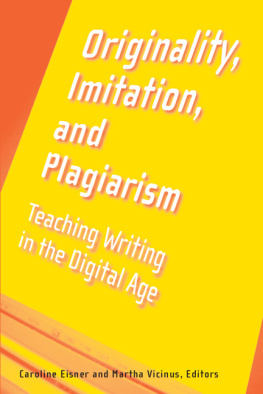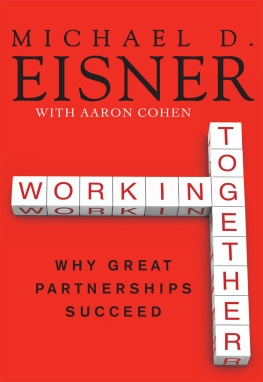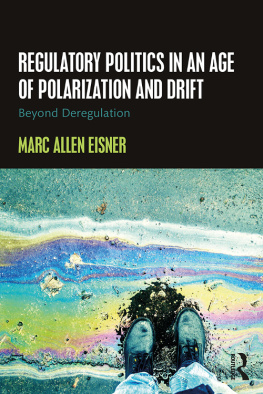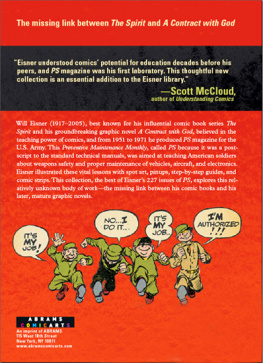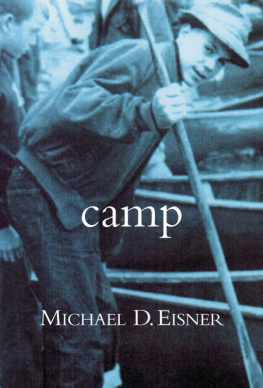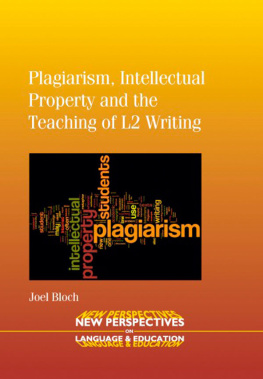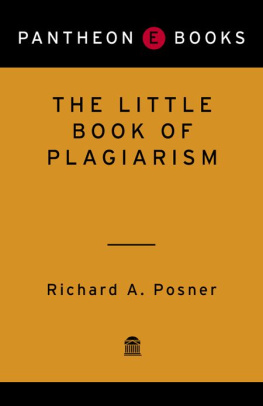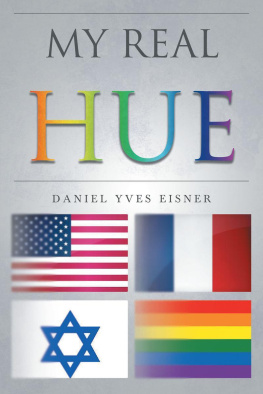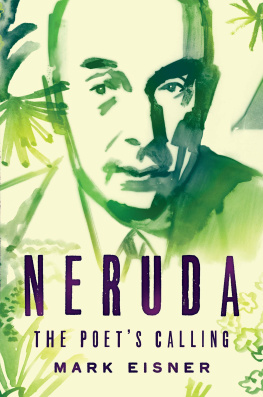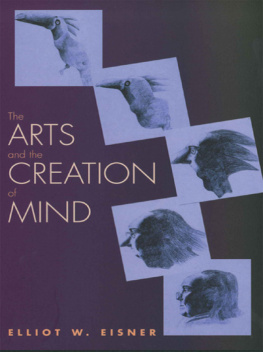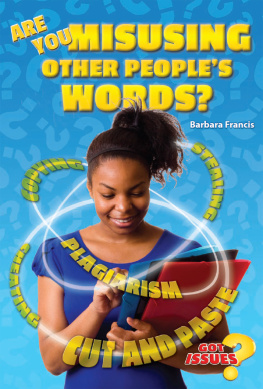Eisner Caroline - Originality, Imitation, and Plagiarism
Here you can read online Eisner Caroline - Originality, Imitation, and Plagiarism full text of the book (entire story) in english for free. Download pdf and epub, get meaning, cover and reviews about this ebook. year: 2018, publisher: University of Michigan Press and University of Michigan Library, genre: Politics. Description of the work, (preface) as well as reviews are available. Best literature library LitArk.com created for fans of good reading and offers a wide selection of genres:
Romance novel
Science fiction
Adventure
Detective
Science
History
Home and family
Prose
Art
Politics
Computer
Non-fiction
Religion
Business
Children
Humor
Choose a favorite category and find really read worthwhile books. Enjoy immersion in the world of imagination, feel the emotions of the characters or learn something new for yourself, make an fascinating discovery.
- Book:Originality, Imitation, and Plagiarism
- Author:
- Publisher:University of Michigan Press and University of Michigan Library
- Genre:
- Year:2018
- Rating:4 / 5
- Favourites:Add to favourites
- Your mark:
- 80
- 1
- 2
- 3
- 4
- 5
Originality, Imitation, and Plagiarism: summary, description and annotation
We offer to read an annotation, description, summary or preface (depends on what the author of the book "Originality, Imitation, and Plagiarism" wrote himself). If you haven't found the necessary information about the book — write in the comments, we will try to find it.
Originality, Imitation, and Plagiarism — read online for free the complete book (whole text) full work
Below is the text of the book, divided by pages. System saving the place of the last page read, allows you to conveniently read the book "Originality, Imitation, and Plagiarism" online for free, without having to search again every time where you left off. Put a bookmark, and you can go to the page where you finished reading at any time.
Font size:
Interval:
Bookmark:

Teaching Writing in the Digital Age
Caroline Eisner and Martha Vicinus
EDITORS
THE UNIVERSITY OF MICHIGAN PRESS AND
THE UNIVERSITY OF MICHIGAN LIBRARY
Ann Arbor
Copyright by the University of Michigan 2008
All rights reserved
Published in the United States of America by
The University of Michigan Press and
The University of Michigan Library
Manufactured in the United States of America Printed on acid-free paper
Printed on acid-free paper
2011 2010 2009 2008 4 3
No part of this publication may be reproduced, stored in a retrieval system, or transmitted in any form or by any means, electronic, mechanical, or otherwise, without the written permission of the publisher.
A CIP catalog record for this book is available from the British Library.
Library of Congress Cataloging-in-Publication Data
Originality, imitation, and plagiarism : teaching writing in the digital age / Caroline Eisner and Martha Vicinus, editors.
p. cm.
Includes bibliographical references and index.
ISBN-13: 978-0-472-07034-3 (cloth : alk. paper)
ISBN-10: 0-472-07034-7 (cloth : alk. paper)
ISBN-13: 978-0-472-05034-5 (pbk. : alk. paper)
ISBN-10: 0-472-05034-6 (pbk. : alk. paper)
1. Plagiarism. 2. Imitation in literature. 3. Creation (Literary, artistic, etc.). 4. AuthorshipStudy and teaching. I. Eisner, Caroline, 1965 II. Vicinus, Martha.
PN167.075 2008
808
dc22
2007036088
ISBN-13: 978-0-472-07034-3 (electronic)
For
John and Susan Sweetland
Generous friends and devoted supporters
Caroline Eisner and Martha Vicinus
Jessica Litman
Gilbert S. Omenn
Amit Ray and Erhardt Graeff
Gordon Kane
Anne Berggren
Jeff Ward
Anis Bawarshi
Christiane Donahue
Amy England Page viii
Christina Pugh
Christopher M. Kuipers
Kim Walden and Alan Peacock
Martine Courant Rife
Michael Grossberg
Laura J. Murray
Lisa Emerson
Stefan Senders
Lynn Z. Bloom
Joel Bloch
Linda Adler-Kassner, Chris M. Anson, and Rebecca Moore Howard
Originality, Imitation, and Plagiarism: Teaching Writing in the Age of the Internet
Caroline Eisner and Martha Vicinus
Across university and college campuses, writing centers face questions about plagiarism. All too often these queries are framed in narrow, judgmental terms that leave little room for either the teacher or the student to understand the complexities of permission, attribution, and copyright. Teachers find themselves placed in an adversarial position in relation to students, as if all writing assignments involved the risk of plagiarism. This collection of essays addresses not only such immediate problems, but also a larger, more central, argument that academic integrity goes beyond the classroom and that any discussion of plagiarism must involve the current questions regarding fair use and copyright. It is no accident that public debates about plagiarism have coincided with efforts to limit access to copyrighted material. On the one hand, we face the exponential increase in readily available information from the Web, and, on the other, threats of property-rights litigation and increasingly limited access to this material. Adding to the mix, postmodern literary theory reminds us that nothing is wholly originalthat we depend on remixing and reusing the past, adding to or remaking old plots, insights, and ideas. Across disciplines and fields, we find that plagiarism is not a simple wrong; a full understanding of its role in contemporary intellectual life depends on a broad approach that includes notions of what is original and what role imitation plays in the creation of new texts. As numerous contributors remind us, at no time has copyright law guaranteed complete control over an individual work.
Within the university we rightly have a profound investment in responsible, independent, intellectual work, lest we undermine the very nature of our profession. Both students and researchers can be tempted to Page 2 short-circuit, via unacknowledged use of others' work, the necessary groundwork in learning; most of those who succumb do not get caught. In the past, before the Web, probably even fewer were caught. Stealing or buying the work of others, however, undermines the credibility of the written word and damages the open and free exchange of ideas. In the past few years, we have witnessed a rash of high-profile plagiarism cases, ranging from a Harvard undergraduate's plagiarized novel to fabrication of evidence in the biomedical field. How do we conserve and inculcate a tradition of ethical research and writing standards, while acknowledging and taking full advantage of the opportunities provided by new technologies? How can students be taught to evaluate sources and then to credit the authors appropriately? Why have so many experienced researchers been found guilty of stealing from others?
The essays selected for this anthology address these and other questions from different points of view. For, as its table of contents reveals, issues of authorial authority and control over writing cut across every area of study. We have organized the essays to highlight the ways in which experts across many fields, ranging from the fine arts to physics, are grappling with these issues. However different the starting point, each author shares a concern about the increasingly angry public debate for or against file sharing, fair use, and plagiarism. We have organized the essays to speak to each other about this issue, as well as about shared pedagogical concerns. We hope that both novice and experienced teachers will learn from the practical and concrete suggestions about how to fashion unique assignments, to teach about proper attribution, and to increase students' involvement in their own writing. At its core, this is an anthology for anyone interested in the process of learning. How can we encourage the free and ethical exchange of ideas? How can we encourage students, so accustomed to digital sharing, to understand citation practices, free use, and the legitimate ownership of ideas? These seemingly local concerns are nevertheless also implicated in larger national issues because access to and use of trustworthy information and writing are, of course, fundamental to public discourse in a democratic society.
Many of the authors included here allude to the groundbreaking work of Rebecca Moore Howard, who first suggested the importance of patch writing for learners confronted with massive amounts of new information. She argues that students frequently quote without citation material that they are still mastering, or may not understand, as an initial step in their learning process. The reasons for such lapses are not easy to come by: Page 3 students may fail to acknowledge their sources because of a failure in teaching the rules; because it is easy to forget who said what when sifting through many different sources; or because they come from countries in which quoting without citing an expert is a way of acknowledging the greatness of the expert's ideas. It may also be that intertexuality is simply fundamental to their knowledge base. Attribution seems artificial in a world saturated with references to familiar songs and popular culture. In her essay, Amy England points to yet another complication: what may be common knowledge to academics is rarely so for studentsand vice versa. Joel Bloch and Lisa Emerson highlight the contextual nature of knowledge and the difficult cultural leaps international students must make to understand what is considered common knowledge within the context of a particular discipline.
Font size:
Interval:
Bookmark:
Similar books «Originality, Imitation, and Plagiarism»
Look at similar books to Originality, Imitation, and Plagiarism. We have selected literature similar in name and meaning in the hope of providing readers with more options to find new, interesting, not yet read works.
Discussion, reviews of the book Originality, Imitation, and Plagiarism and just readers' own opinions. Leave your comments, write what you think about the work, its meaning or the main characters. Specify what exactly you liked and what you didn't like, and why you think so.

